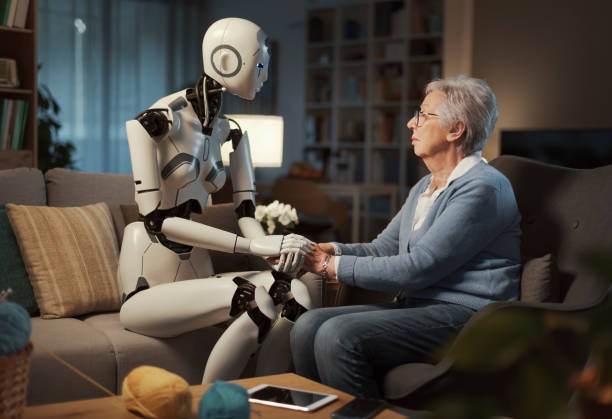 22
22Apr
At Cohesion, our team attend events and conferences to support their knowledge and expertise development. It’s what makes us better at recruitment.
In this blog, we explore the topic of emerging AI (Artificial Intelligence) in care, as attended during ‘UK Care Week’ by Cohesion’s Recruitment Expert, Lewis.
In recent years, the integration of artificial intelligence into various aspects of our lives has become increasingly prevalent. From managing our schedules to controlling our home appliances, AI technology has found its way into nearly every facet of modern living.
But what about AI’s potential for the social care workforce? Can robots effectively support the role of Care & Support Workers, providing companionship and support?
Assessing the Effectiveness of AI Care
In one session at the conference, Lewis learned how researchers had set out to determine whether robots could promote mental health and reduce loneliness among elderly individuals. A trial explored the benefits of introducing robots alongside Care Assistants which included cultural awareness features too.
Changing Perceptions: From Scepticism to Acceptance
Initially, some participants expressed scepticism and apprehension towards the idea of robots in Care & Support roles. There was a fear that machines would replace humans, leading to a loss of personal connection and empathy. However, attitudes began to shift. Through firsthand experience, participants came to understand the purpose of the robots and the benefits they could offer.
Looking Ahead: The Future of AI in Social Care
As we look to the future, the potential applications of AI in social care are vast. Predictions suggest that robots will evolve to provide physical care tasks such as assisting individuals out of bed, preventing falls, and delivering meals. This could revolutionise the way care is provided, moving towards an advanced model of home care with the support of AI companions.
However, the widespread adoption of AI in the care sector faces challenges, particularly regarding cost. Arguably, care providers will find investment in expensive robot technology challenging without adequate funding and support.
The integration of AI technology into social care holds immense promise for improving the quality of life for people requiring care and support. While robots may never fully replace humans – and in our recruitment and people positive opinion, shouldn’t; they may well prove to serve as valuable companions.
What about recruitment?
From a recruitment perspective, our teams at Cohesion have found benefits to appropriately using AI chat features to support the engagement process – to book appointments with candidates and also help them prepare the required ID for interview which has enabled quicker Right to Work and DBS checks. For one client, over a 3-month period we reported 420 interactions with the technology, 250 booked career conversations (our telephone interview), and 31 candidates were automatically screened out due to not having the required Right to Work. Candidates arriving to interview with the correct ID documents improved significantly.
As we embrace the potential of Artificial Intelligence in the care sector, we must work towards ensuring that these advancements support, rather than replace, our ever-hardworking workforce. And in the meantime, AI tools for certain processes – including recruitment – can be welcomed as a supportive addition to a human-driven function.
What do you think? Will robots play an important part in the future of care? Let Lewis know – lewis.kelly@cohesionrecruitment.com.